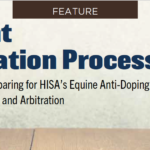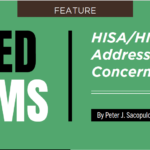U.S. Department of Justice Approved ‘Miniature Horse’ as Service Animal
By: Peter J. Sacopulos, JD
Clinical hypnotherapist, Kathleen Nightingale, works with people living with Alzheimer’s and other types of dementia. Kathleen and her husband had always enjoyed thoroughbred horses, so they decided to combine their passion for horses with Kathleen’s professional skill. Their interests merged and have developed into an equine therapy program. One of their star equine partners in providing this unique therapy is Titch, a Palomino miniature horse.
“People with hearing and vision impairments generally have more fear or more paranoia. The bond with a horse can improve their confidence and their self-esteem, which in turn improves their quality of life,” Nightingale said.
There is a need, a great need, for more horses like Titch. There are 54 million Americans with disabilities. One out of six of these persons, over nine million, live with significant physical and sensory impairments. To assist those living with such disabilities, there are roughly 12,000 trained assistance dogs available, far short of the nine million needed. However, a new federal law now recognizes miniature horses, as well as dogs, as service animals.
Definition of a Service Animal
Service animals are defined as dogs, and now miniature horses, that are individually trained to do work or perform tasks for people with disabilities. Examples of such work or tasks include guiding people who are vision impaired, alerting people who are deaf, pulling a wheelchair, protecting a person who is having a seizure, reminding a person with mental illness to take prescribed medications, and calming a person with Post Traumatic Stress Disorder (PTSD) that is or about to experience an anxiety attack. Service animals are working animals; they are not pets. The work and tasks a service animal has been trained to provide must be directly related to the person’s disability. Dogs and miniature horses whose sole function is to provide comfort or emotional support do not qualify as service animals under the Americans with Disabilities Act.
Not all miniature horses have the temperament to be service animals. Despite this, many miniature horses that do not have the training or temperament to qualify as a “service animal” are being effectively and successfully utilized to assist and heal those in need. Outside of Clearwater, Florida, Kathy Van Dyke continues on with her mission to bring happiness to those living in nursing homes and rehabilitation facilities with her miniature horse Star. Star is a miniature horse that makes patients smile.
On a recent visit to a rehabilitation facility, the Director told her only certain patients respond to stimulus. Mrs. Van Dyke noticed there was a lady starring off into space. The Director told her to not waste her time. However, as Kathy walked away with Star, the lady reached out for Star. When Star got close the woman embraced Star. This is but one example of equine therapy being successful when other traditional modalities fail.
On another occasion, a man “ . . . was standing by his doorway and I went walking up to him and said, hey, do you like horses?” said Mrs. Van Dyke. The gentleman answered: “I could take them or leave them.” Mrs. Van Dyke responded: “would you like to pet this one?” The gentleman then started talking about how he was raised on a farm and relating childhood memories and laughing. The Director of the facility, in amazement, said “I have never seen him talk to anybody and I have never seen him laugh.” Whether physical interaction or presence, the miniature horse can and is playing a key and growing role in therapy.
Miniature Horses
The Department of Justice recently revised ADA regulations to recognize and allow miniature horses, that have been individually trained to do work or perform tasks for people with disabilities, to qualify and serve as service animals. Miniature horses generally range in height from 24 inches to 34 inches measured to the shoulders and generally weigh between 70 and 100 pounds. As a service animal, the miniature service horse has advantages over the service dog. One of these advantages is life expectancy. Service dogs on average live to be about 12-15 years old; a miniature service horse’s life expectancy ranges from 35-40 years. Another advantage the miniature service horse has relative to the service dog is size and strength. For many injured servicemen returning from Iraq and Afghanistan, the size and strength of the miniature service horse is far better suited than is a service dog.
Pursuant to these new regulations, entities covered by the ADA must modify existing policies to permit and accommodate miniature service horses. The ADA regulations have four assessment factors to assist entities in determining whether miniature service horses must be accommodated in their facility. The assessment factors are (1) whether the miniature horse is housebroken; (2) whether the miniature horse is under the owner’s control; (3) whether the facility can accommodate the miniature horse’s type, size, and weight; and (4) whether the miniature horse’s presence will compromise legitimate safety requirements necessary for safe operation of the facility.
Where Service Animals Are Allowed
Pursuant to the ADA rules, State and local governments, private businesses and nonprofit organizations that serve the public must allow service animals to accompany people with disabilities in all areas of the facility where the public is normally allowed. For example, in a hospital it is violation of the ADA Rules to exclude a service animal from areas such as patient rooms, clinics, cafeterias, or examination rooms. However, depending on the circumstances, it may be appropriate to exclude a service animal from operating rooms or burn units where the animal’s presence may compromise a sterile environment. Also, ADA rules require service animals to be under control. In the case of a miniature horse, serving as a service animal, it must be harnessed, leashed, or tethered, unless these devices interfere with the service animal’s work or the individual’s disability prevents using these devices. In such cases, the individual must maintain control of the service animal by voice, signal, or other effective controls.
Inquiries, Exclusions, Charges, and Other Specific Rules Related to Service Animals
When it is not obvious what service an animal provides, only limited inquiries are allowed under the ADA rules. Staff may ask two questions: (1) is the service animal required because of a disability; and, (2) what work or task has the dog/miniature horse been trained to perform. Staff cannot ask about the person’s disability, require medical documentation, require a special identification card or training documentation for the service dog/miniature horse, or ask that the service dog/miniature horse demonstrate an ability to perform the work or task.
Allergies and fear of service dogs/miniature horses are not valid reasons for denying access or refusing service to disabled persons with service animals. When a person who is allergic to a service dog/miniature horse dander, for example, in a school classroom, both the disabled individual with the service animal and the person/patron with the allergy must be accommodated by assigning them, if possible, to different locations within facility.
A person with a disability may not be asked to remove his/her service animal from the premises unless: (1) the service dog/miniature horse is out of control and the handler does not take effective action to control the service animal, or; (2) the service dog/miniature horse is not housebroken. When there is a legitimate reason to request that a service animal be removed, the law requires the staff must offer the person with the disability the opportunity to obtain goods or services without his/her service animal being present.
Additionally, pursuant to the ADA rules, an establishment that sells or prepares food must allow service animals in public areas even if state or local health codes prohibit animals on the premises. In short, the federal ADA rule allowing and permitting service animals access trumps state and local rules and regulations.
Further, disabled persons being assisted by a service animal may not be isolated from other patrons, treated less favorably than other patrons, or charged fees that are not charged to other patrons without service animals. If a business or facility requires a deposit or fee for patrons with pets, that fee must be waived for service animals. However, if a business, such as a hotel, normally charges patrons for damage that they cause, a customer with a disability may be charged for damage caused by himself/herself and/or by his or her service animal. Also, businesses are not required to provide care or food for a service animal.
With the addition of miniature horses to the list of service animals, horse breeders may step into a new arena to assist those disabled. There are millions of people living with disabilities waiting for a service animal to assist them. The need is very large; the miniature horse quite small. However, with the miniature horse, this gap will be narrowed and that is a good thing for both the disabled and those with a passion for equine and assisting others.





